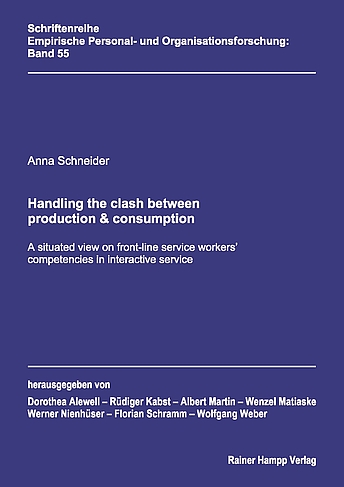Schneider
Handling the clash between production & consumption
ISBN 978-3-95710-064-1
englischThe majority of the workforce is currently employed in the service industry where many employees are involved in daily face-to-face service interactions with customers. At the same time, these direct customer interactions are increasingly put under pressure for example, in traditional retailing by alternative distribution channels. Nevertheless, whenever an essential part of a business-model’s value-creation process builds on interactive service work, both front-line service workers and customers are forced to mutually work together in service interactions. The present study shows the tensions front-line service workers face between demands for cost-efficiency on the one hand and customer service on the other. Although these two rationalities do not necessarily contradict each other on an organizational level, individual front-line service workers face these contradictions in the form of challenging tensions in every day interactions with customers. Building on rich and comprehensive observational and interview data from the retail sales floor, the interpretive research approach allows the analysis of the challenges of interactive service work and carves out the corresponding competencies to handle the clash between production and consumption which manifest in service interactions. Drawing on Convention Theory (“Économie des conventions”), the situation as unit of analysis becomes center stage. Convention Theory shows that not only are individual characteristics such as friendliness important for successful service interactions, but especially the competent interplay between individual resources and organizational settings within the situation of interaction is essential. The results shed new light on individuals’ contributions to successful service interactions and contributes to a more fine-grained picture of the challenges and competencies in interactive service work.
The majority of the workforce is currently employed in the service industry where many employees are involved in daily face-to-face service interactions with customers. At the same time, these direct customer interactions are increasingly put under pressure for example, in traditional retailing by alternative distribution channels. Nevertheless, whenever an essential part of a business-model’s value-creation process builds on interactive service work, both front-line service workers and customers are forced to mutually work together in service interactions. The present study shows the tensions front-line service workers face between demands for cost-efficiency on the one hand and customer service on the other. Although these two rationalities do not necessarily contradict each other on an organizational level, individual front-line service workers face these contradictions in the form of challenging tensions in every day interactions with customers. Building on rich and comprehensive observational and interview data from the retail sales floor, the interpretive research approach allows the analysis of the challenges of interactive service work and carves out the corresponding competencies to handle the clash between production and consumption which manifest in service interactions. Drawing on Convention Theory (“Économie des conventions”), the situation as unit of analysis becomes center stage. Convention Theory shows that not only are individual characteristics such as friendliness important for successful service interactions, but especially the competent interplay between individual resources and organizational settings within the situation of interaction is essential. The results shed new light on individuals’ contributions to successful service interactions and contributes to a more fine-grained picture of the challenges and competencies in interactive service work.


